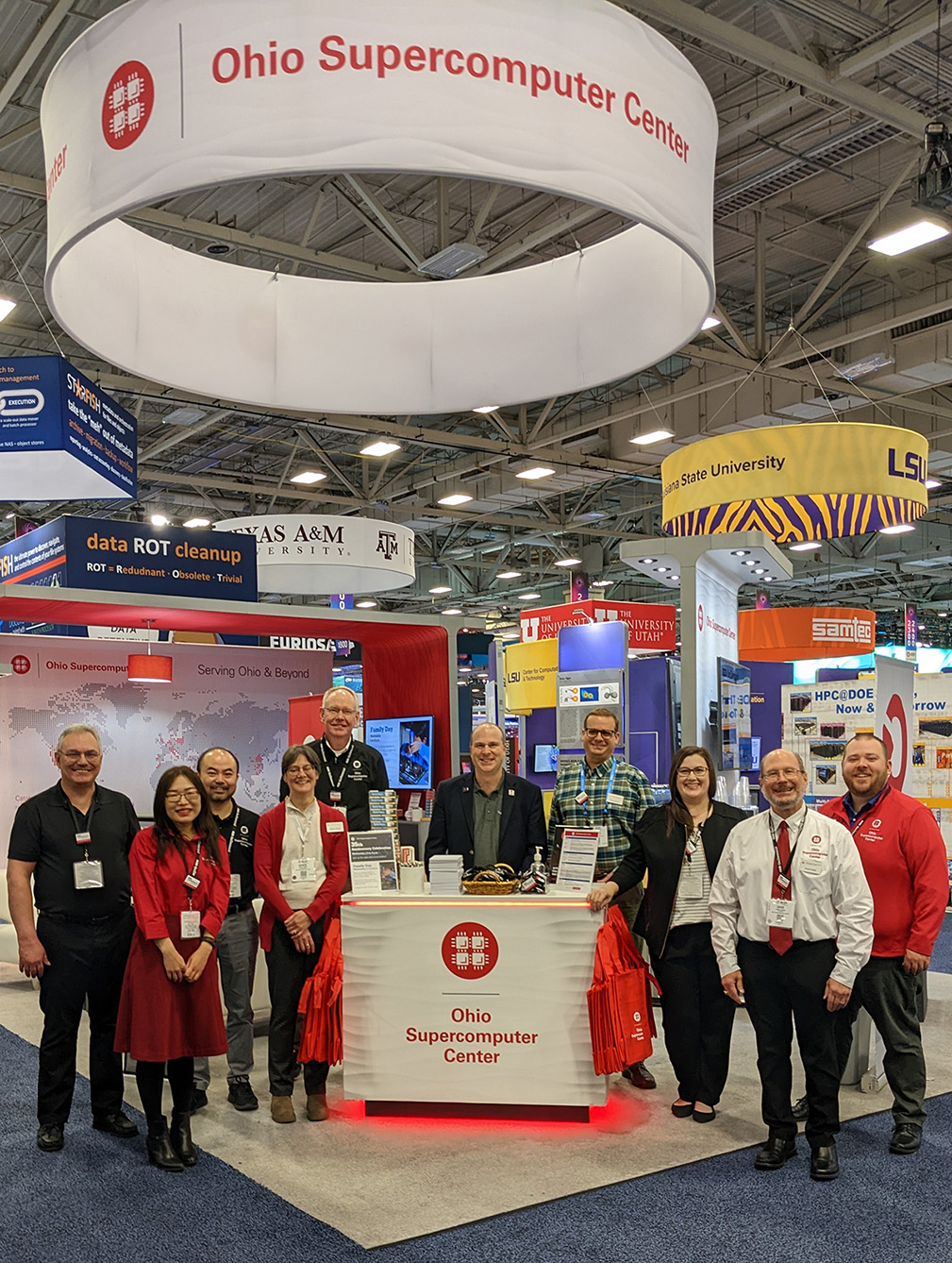Continuing a long tradition of leadership in the field, Ohio Supercomputer Center (OSC) staff participated in and helped plan three large research computing-focused conferences this fall, advancing and learning from the national conversation in high performance computing (HPC).

SC22
A contingent of 12 OSC staff members attended or contributed to SC22, including 10 onsite in Dallas, Texas, from Nov. 13–18. Established in 1988, the supercomputing conference brings people from around the world together to advance high performance computing, networking, storage and analysis.
“Each year, SC is a wonderful opportunity to reconnect with and learn from our peers and partners across the industry,” Hudak said. “It is also a remarkable venue for forming new relationships as we expand and evolve our services, and this year was as effective as ever.”
OSC staff participated in the technical program both as attendees and presenters in a wide-ranging set of panels, workshops and other informational sessions.
Kate Cahill, education and training specialist, Shameema Oottikkal, data applications engineer, and Karen Tomko, director of research software applications, were all presenters for the workshop “An Artificial Intelligence Bootcamp for Cyberinfrastructure Professionals.”
Tomko also served on the organizing committee and as program committee chair for HUST-22: 9th International Workshop on HPC User Support Tools, and was a presenter for “Birds of a Feather: Training the CI Workforce AI at Scale.”
Cahill additionally presented “Developing Standards for HPC Education and Training Repositories” as part of the Ninth SC Workshop on Best Practices for HPC Training and Education.
Alan Chalker, director of strategic programs, and Gerald Byrket, web and interface app lead engineer, presented “Birds of a Feather: Open OnDemand User Group Meeting.”
The Center also hosted a booth in the event’s exhibit hall, educating visitors about OSC’s services and its open-source, NSF-funded HPC portal Open OnDemand, deployed by more than 400 other HPC providers around the world. Activities included Open OnDemand demonstrations, a celebration of OSC’s 35th anniversary and a Family Day activity for children to reconstruct a supercomputer node.
See more: Take a virtual tour of OSC's SC22 booth
OSC gained new visibility in the exhibit hall this year as staff distributed more than 70 Open OnDemand placards to exhibitors actively supporting or using the platform for display in their booths.
“We were amazed to see, quite literally, the extent to which this project has permeated the HPC landscape in the last few years,” Chalker said. “SC22 clarified the importance of Open OnDemand and the scale of OSC’s impact on the wider research computing community. The outcomes of our work were fully on display.”
CASC Fall 2022 Membership Meeting
The Coalition for Academic Scientific Computation (CASC) is an educational non-profit with more than 100 member institutions, including OSC. It advocates for the use of the most advanced computing technology to accelerate scientific discovery for national competitiveness, global security and economic success.
The Fall 2022 Membership Meeting, which took place Oct. 18-20 in Arlington, Virginia, convened leaders in academic supercomputing to share insights, discuss policy and explore challenges and opportunities in the field. The conference program also included updates from federal funding agencies for research such as the National Science Foundation (NSF) and the Department of Energy Office of Science.
Hudak served on the planning committee for the conference, helping to orchestrate the content and logistics of the meeting.
He also served as a presenter, delivering “NSF ACCESS: What you need to know” on behalf of the ACCESS team. ACCESS, short for Advanced Cyberinfrastructure Coordination Ecosystem: Services and Support, aims to increase the accessibility of cyberinfrastructure centers in the nation and improve the integration between systems and research communities on campuses across the nation.
“The rich conversations that took place at the CASC Fall 2022 Membership Meeting confirmed that just like OSC, our peers across the country are experiencing rapidly growing demand,” Hudak said. “Our role and our impact in Ohio’s academic and commercial research landscape will only continue to expand.”
Gateways 2022
The annual Gateways conference took place this year in San Diego, California, Oct. 18-20. Hosted by NSF-funded SGCI and SGX3, the event brings together developers who are creating tools that make it easier for scientific researchers to leverage advanced computing via the web such as Open OnDemand.
In a pre-conference virtual tutorial, OSC staff demonstrated the ease and simplicity of creating an app interface, or gateway, in Open OnDemand. Members of the Open OnDemand project team also attended in person, including Travis Ravert and Jeff Ohrstrom from OSC and Bob Settlage from Virginia Tech. They hosted an exhibitor table during the conference, and Settlage gave a presentation on Open OnDemand during the plenary sessions.
By participating in conferences like SC, the CASC Membership Meeting and Gateways, OSC helps advance the broader research computing community and brings back technology and best practices from across the nation that can better serve Ohio’s students and faculty.
“It is crucial for our team at OSC to participate in these collective discussions,” Hudak said. “As leaders in HPC globally, these are opportunities not only to shape the future of the industry, but also to bring that knowledge back to Ohio as we support research and economic development in the state.”
The Ohio Supercomputer Center (OSC) addresses the rising computational demands of academic and industrial research communities by providing a robust shared infrastructure and proven expertise in advanced modeling, simulation and analysis. OSC empowers scientists with the services essential to making extraordinary discoveries and innovations, partners with businesses and industry to leverage computational science as a competitive force in the global knowledge economy and leads efforts to equip the workforce with the key technology skills required for 21st century jobs.